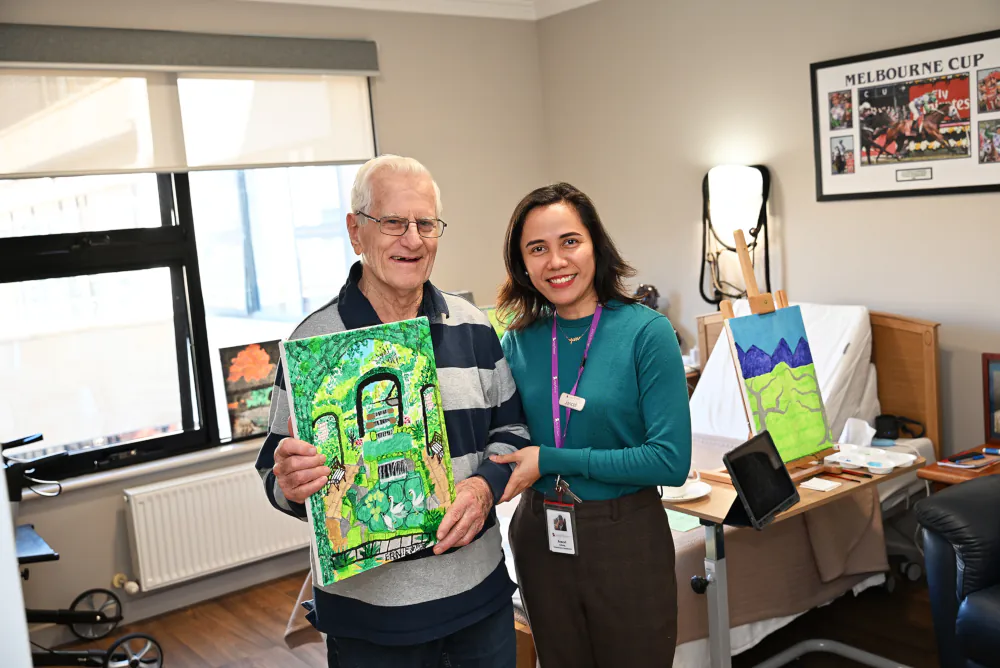Dementia Action Week: Understanding and Supporting Those Living with Dementia

Dementia Action Week, from 16–22 September, encourages everyone to increase their understanding of dementia and explore ways to create more inclusive, supportive communities for people living with the condition.
What is Dementia?
Dementia is a condition that affects the brain, causing memory loss, difficulty with thinking, and changes in behaviour and emotions. It’s not a natural part of ageing and can affect people of all ages, but most commonly affects people over the age of 65.
The most common type is Alzheimer’s disease, but there are other types, such as vascular dementia and Lewy body dementia.
Are Alzheimer’s Disease and Dementia Different, or are they the same thing?
A: Yes, and no.
‘Alzheimer’s disease’ is the most common and well-known type of dementia.
‘Dementia’ is a general ‘umbrella’ term for a decline in cognitive ability that interferes with daily life, while Alzheimer’s disease is a specific brain disease that causes a gradual decline in memory and thinking skills, and falls under the umbrella term of ‘dementia’.

Early Warning Signs for Dementia
Recognising the early signs of dementia is important for early diagnosis and management for you or your loved one.
Some common early warning signs include:
- Difficulty completing everyday tasks, like preparing meals or paying bills.
- Disorientation, including confusion about time or location.
- Language difficulty, such as forgetting words or using the wrong ones.
- Personality and mood changes, including sudden mood swings or withdrawal.
- Frequently misplacing regularly used items such as keys, or putting them in odd places.
If you notice these signs in yourself or a loved one, it’s a good idea to speak with a healthcare professional, such as your GP, for further advice.
Symptoms of Dementia
Dementia affects people in many different ways and not everyone experiences symptoms the same way. Some common symptoms include:
- Short-term memory loss, such as forgetting recent conversations or events.
- Difficulty with problem-solving or making everyday decisions.
- Challenges with communication and understanding language.
- Confusion about time and place, including difficulty navigating familiar environments.
- Changes in behaviour, such as becoming restless or agitated.
- Decline in mobility, and fine motor skills.
Despite these symptoms, many people living with dementia can still maintain meaningful connections and enjoy fulfilling activities with the right care and understanding.
How to Support a Loved One Living with Dementia
Supporting someone living with dementia can make a huge difference to their wellbeing.
Here are five key tips:
- Be patient and reassuring: Offer calm, supportive responses to help ease anxiety and frustration. Never argue with them, but meet them where they are in their mind.
- Stay connected: Regular interaction helps your loved one feel connected and supported.
- Maintain a safe, familiar environment: Familiar surroundings and routines can help reduce confusion.
- Encourage independence: Let them do what they can on their own to boost confidence and self-esteem.
- Keep learning: Understanding more about dementia will help you better support your loved one and prepare for the future.
Caring for a Loved One Living with Dementia at Home
Caring for someone with dementia at home can be both rewarding and challenging. Home care can take many forms, and Mayflower’s Home Care services provide compassionate, responsive support to promote health, well-being, and independence. This allows your loved one to remain happy, healthy, and socially connected in their community.
Mayflower offers customised Home Care packages across Melbourne’s Northern and Bayside suburbs, as well as the Mornington Peninsula, tailored to your personal needs. Services include:
- Personal Care: Assistance with bathing, showering, and dressing.
- Domestic Assistance: Help with light or heavy housework, including vacuuming, laundry, and deep cleaning.
- Meals and Nutrition: Support with meal planning, preparation, and even meal delivery.
- Shopping, Errands, and Transport: Help with errands, transportation to appointments, or attending community events.
- Nursing Support: Coordination with medical practitioners to ensure necessary nursing care.
- Companionship: Enjoy a walk or spend time reminiscing with a companion.
- Respite Care: In-home respite care to allow primary caregivers time to recharge.
Support for Carers
Caring for a loved one living with dementia can be a challenging journey, and support is available.
The Carer Gateway, run by Carers Australia, offers valuable support, including counselling, educational resources, and peer support. You can reach them on 1800 422 737.
For confidential dementia care support, you can contact Dementia Australia’s National Dementia Helpline:
The National Dementia Helpline is free, and available 24/7.
- Free call: 1800 100 500
- Webchat: dementia.org.au/helpline/webchat
- Email: helpline@dementia.org.au
This Dementia Action Week, take the time to learn more and explore ways to offer meaningful support to those living with dementia. Visit Dementia Australia for more information.
Mayflower aged care has dementia specific memory support units in our facilities, to care for your loved one in a supportive and safe environment.
Welcome to Dementia Action Week from Wally Lewis AM
Listen a an introduction and welcome to Dementia Action Week 2024 from Dementia Australia Ambassador and rugby league titan Wally Lewis AM. This welcome message was shared by Dementia Australia.










